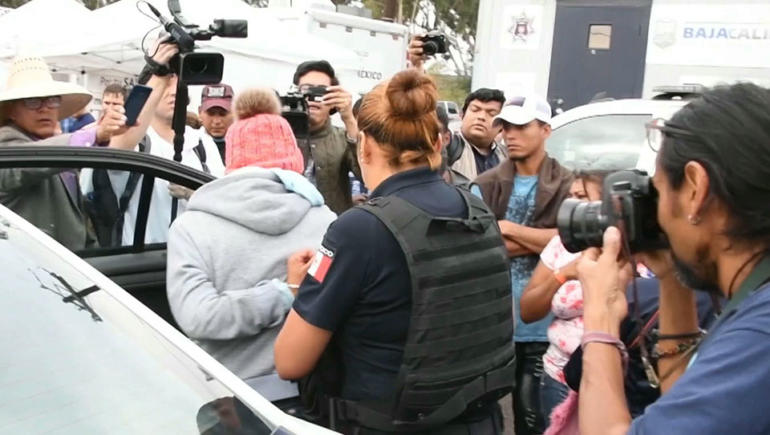Mexico’s president-elect, Andres Manuel Lopez Obrador, takes office on Saturday. When he does, he’ll have to deal with the caravans of Central American migrants traveling through Mexico toward the U.S. border.
As CGTN’s Alasdair Baverstock reported, the president-elect has a plan ready.
Arrests, tear gas and deportation.
That is how the story ended over the weekend for dozens of Honduran migrants. They had trekked more than three and-a-half thousand kilometers under a blistering sun. Rejecting Mexico’s offer of asylum, they chose instead to make a run for the U.S. border.
Many never got across. At the San Ysidro Port of Entry near San Diego, a skirmish line of helmeted Mexican police with body armor and shields blocked them on the Mexican side. On the other side—U.S. border patrol officers fired tear gas to fend them off.
That they were unwanted couldn’t have been clearer. If walls of Mexican federal police and U.S. border guards didn’t get that message across, another Donald Trump Tweet helped make it explicit. On Monday the U.S. president threatened to close the U.S. border to the migrants, “permanently.”
“Mexico should move the flag waving Migrants, many of whom are stone cold criminals, back to their countries,” he wrote. He said he didn’t care how Mexico did it: “Do it by plane, do it by bus, do it anyway you want, but they are NOT coming into the U.S.A. We will close the Border permanently if need be. Congress, fund the WALL!”
Thousands of migrants remain stranded in nearby Tijuana—overwhelming the city’s social services.
For most, returning home is an option of last resort. Staying in Mexico appears to be a second-to-last resort—even with Mexico’s offer of political asylum and temporary work visas.
President-elect Andrés Manuel López Obrador, better known in Mexico by his initials, AMLO, takes office on December 1. Back in October he said he would offer Central American migrants temporary work permit visas should they choose to stay.
Most have rejected the offer. “I left my country with a dream of reaching the U.S., not to stay in Mexico” said Wilmer Romero, a migrant from Honduras who told CGTN he is too close to his goal to give up now.
Some may be considering it. Darwin Pereyra, who is accompanied by his wife and two young daughters, says he wants a job—wherever he can find one. “Over there, or here, it doesn’t matter. The important thing is to work,” he told CGTN.
While Mexico’s temporary work visas don’t guarantee migrants a job, non-governmental organizations in Tijuana are already helping them look for work.
“The doors have been opened to people in this exodus, who can apply and enter legally through work,” said Leoni Romero, part of a Roman Catholic charitable group. She was at the caravan camp, taking names of interested migrants.
“We are arranging buses to take them to an employment fair,” she said. If offered work, she said: “they can get their papers through a company, get a job and join Mexican society.”
Many Mexicans aren’t sold on this policy.
“I don’t think the policy is a good idea, because there is already too much unemployment in Mexico,” said Alma Navarro, a professor of Politics and Economic’s at Tijuana’s University of Baja California.
Navarro expects the incoming administration to face significant opposition. “The question the administration will face from the public is as to why they are helping foreigners over the local population?”
 CGTN America
CGTN America

